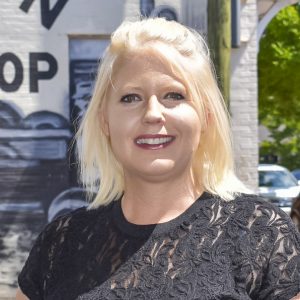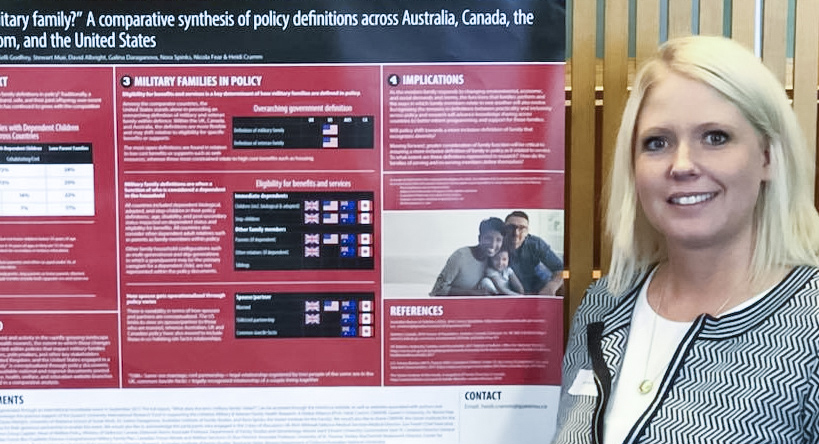Study will explore psychosocial needs of military members, dependents diagnosed with cancer
By David Miller
July 8, 2020

Kelli Godfrey, PhD student
Kelli Godfrey’s bout with Hodgkin’s Lymphoma in 2014 lasted six months before she was declared cancer-free. Reaching remission was and still remains a blessing, but as a military spouse, she was uniquely isolated to navigate the arduous path of treatment and recovery.
Godfrey and husband at the time were stationed at Fort Hood, Texas, where she worked as an advocate for sexual assault victims with the U.S. Army. Godfrey was diagnosed with cancer that May, the beginning of logistical hurdles from using military and civilian healthcare, coupled with the daily challenges of managing both her family and career.
“My primary care doctor was on post, where I’d have my bloodwork, but my treatments were done off-post, so there was a lack of continuity in trying to figure out where to go, and also in having those doctors communicate,” Godfrey said. “My husband at the time still had a very active role on the brigade staff, so I’m trying to take care of my daughter and take off work to go to radiation treatments.”
Godfrey didn’t live near family or friends who could shoulder some of the burden of transportation and childcare while she underwent treatment. She didn’t have an organized support network from the military, either.
For Godfrey, her experiences begged the question: how do the psychosocial needs for military members and dependents battling cancer differ from those experienced by civilians? That question would eventually shape her dissertation focus at the University of Alabama School of Social Work, where she is pursuing a PhD.
Her dissertation, Psychosocial Needs of Active Duty Military or Spouses with Cancer Diagnosis, has been funded by the American Cancer Society through its Doctoral Grant in Oncology Social Work. The ACS grant is for $40,000 over two years.
Godfrey’s mixed-methods dissertation will include a survey of people currently undergoing cancer treatment and those in remission, along with in-depth interviews to better understand details of each patient’s psychosocial needs.
Godfrey said that, during her treatment, the landscape for online support groups was virtually non-existent. It wasn’t until recently that she found and joined a Facebook group where she’s been able to connect with others who are undergoing treatment, in survivorship, or have passed away.
Still, despite pleas from Dr. David L. Albright, her dissertation chair, to pursue the topic, she “kept fighting it.”
“I was staying away from this topic for the longest time because it was too close to home,” Godfrey said. “But, a professor I know was diagnosed with stage 4 breast cancer and has stepped away [from work] to take care of her health. She’s former Marine, and so it hit home that these answers are still very much needed, and it’s up to me to take on this space.”
Godfrey plans to defend her proposal this fall before seeking IRB approval to begin researching in the spring. She hopes to defend her dissertation and complete her PhD by Spring 2022.
Dr. Ellen L. Csikai, an expert in end-of-life and palliative care, will “have an active role” in shaping the research of the study, Godfrey said.
“I’m grateful and thankful for the support from Dr. Albright, who has given me so many opportunities since I started working with him in Fall 2016,” Godfrey said. “I have international publications because of him. The support he and Dr. Csikai give me is immense. Sometimes they’re overlooked with things they’re doing with students, but they’ve helped me tremendously.”
